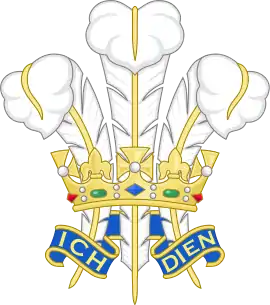Turquoise Mountain Foundation
Turquoise Mountain (in Dari [daˈɾiː], Bonyad-e Ferozkoh) is a non-governmental organisation legally established in Scotland. It takes its name from Turquoise Mountain, the lost capital of the Ghorid dynasty, and focuses on the revival of historic areas and traditional crafts. Turquoise Mountain initially worked in Kabul, Afghanistan,[1] and has since expanded its work to Myanmar,[2] Saudi Arabia[3] and Jordan.[4]
History and activities
Turquoise Mountain was founded in 2006 by Charles, Prince of Wales, in partnership with President of Afghanistan Hamid Karzai,[5] and British writer and politician Rory Stewart, later a Conservative member of Parliament.[1] Stewart was chief executive of the foundation from 2005 to 2008;[6] the current chief executive is his wife Shoshana Stewart.[7]
The group describes its mission as "to preserve and regenerate historic areas and communities with a rich cultural heritage and to revive traditional crafts, to create jobs, skills and a renewed sense of pride."[8] Funding has been provided by a number of public and private donors from both the West and Middle East,[9] including the United States Agency for International Development (USAID), the Government of Afghanistan, the Alwaleed Bin Talal Foundation (Saudi Arabia) and the British Council.[10]
In Afghanistan
In Afghanistan, Turquoise Mountain created the Turquoise Mountain Institute for Afghan Arts and Architecture, a school for the study of traditional Afghan calligraphy, ceramics, woodworking and jewelry-making.[1] Many of the Institute's graduates go on to set up their own craft businesses, and many of them are Afghan women.[1] The Institute is the country’s premier crafts vocational training institution, with internationally accredited three-year courses.
Turquoise Mountain has also helped to build over 50 small craft businesses in Afghanistan.
In the Old City of Kabul, Murad Khani, Turquoise Mountain has restored and rebuilt over 150 historic and community buildings, training thousands of builders, for which it won a UNESCO Cultural Heritage Award in 2013. Turquoise Mountain also established a Family Health Clinic, which has served over 136,000 patients to date, 70% of whom are female, and a Primary School, which teaches over 120 children each year.[9][11]
In Myanmar
Turquoise Mountain has trained over 300 jewellers and other artisans in Myanmar to set the gold standard for the craft industry, and is now working with textile weavers and artisans across the country. The Turquoise Mountain jewellery workshop is selling lines designed by Pippa Small, the UK’s Ethical Jeweller of the Year in 2015, and others, through luxury retailers such as Barneys NY and Net-a-Porter. Turquoise Mountain supported weavers are also supplying high-end products to luxury hotels and clients in Myanmar and internationally. In 2016, the organisation completed the restoration of 491-501 Merchant Street in Yangon’s Historic Downtown, and in summer 2019 it completed the regeneration of the landmark Tourist Burma building, bringing the historic building back into public use. In total, Turquoise Mountain has trained over 500 engineers and builders across its restoration projects.
In Saudi Arabia
Turquoise Mountain has trained, mentored and worked with more than 1,000 Saudi artisans – a majority of whom are women – to help them build thriving crafts businesses that generate income. Turquoise Mountain supported artisans in Saudi Arabia have created thousands of world-class products for luxury sector clients, from five-star hotels to international online retailers. Turquoise Mountain has also showcased Saudi crafts in high-profile exhibits and linked artisans with international designers such as jeweller Vicki Sarge.
In Jordan
Turquoise Mountain is supporting over 200 artisans from Jordan, Syria, Palestine and elsewhere, connecting them to markets and helping to preserve their traditions. The organisation works with artisans in their own workshops, in refugee camps, and in apprenticeship settings, insuring the transmission of heritage skills such as wood inlay, marquetry, carving, copper and brass, textiles, and more. Turquoise Mountain has also run training programmes with hundreds of children and families, engaging displaced groups and local communities in cultural heritage activities. Turquoise Mountain brought the work of Jordanian and Syrian artisans to the Buckingham Palace Summer Opening in 2018.
Alumni
References
- Felicia Craddock, In Afghanistan, Creating Jewelry in the Midst of Conflict, New York Times (September 11, 2014).
- Myanmar, Turquoise Mountain.
- Saudi Arabia, Turquoise Mountain.
- Jordan, Turquoise Mountain.
- "The Turquoise Mountain Foundation becomes The Prince's 18th charity". Prince of Wales website. 25 March 2007. Archived from the original on 2007-07-01.
- Erwin James, Rory Stewart: 'I'll resign if prison violence doesn't improve', The Guardian (January 23, 2019).
- Edward Malnick, Rory Stewart reveals the secret to his success: his wife who has quietly been running his campaign to become Tory leader, The Telegraph (June 16, 2019).
- About, Turquoise Mountain.
- Alisa Tang, Kabul's old city gets a new look, New York Times (February 1, 2008).
- Turquoise Mountain Brochure (PDF), Turquoise Mountain Foundation, 2009, archived from the original (PDF) on 2012-03-01
- Stefanie Glinski, 'There is less fear': restoration of Kabul repairs the ravages of war, The Guardian (May 13, 2019).
